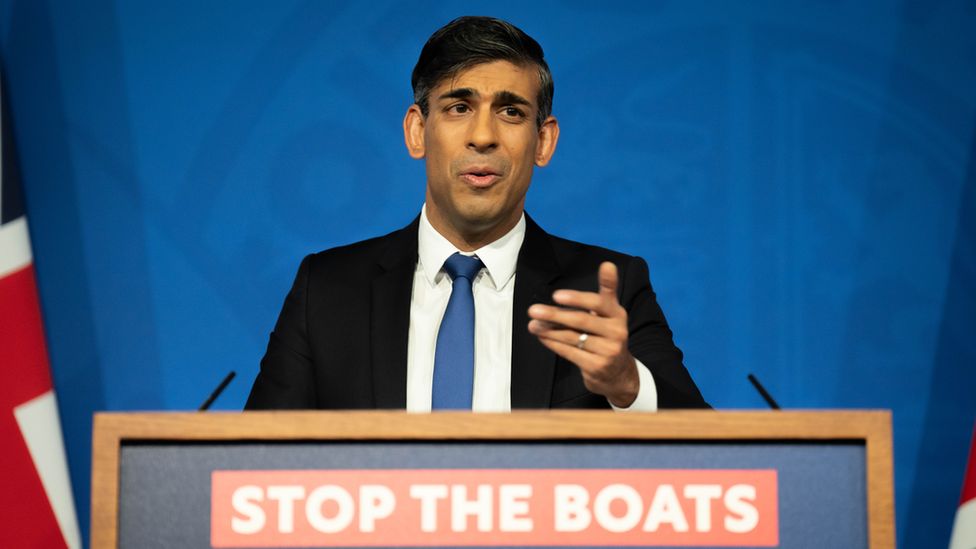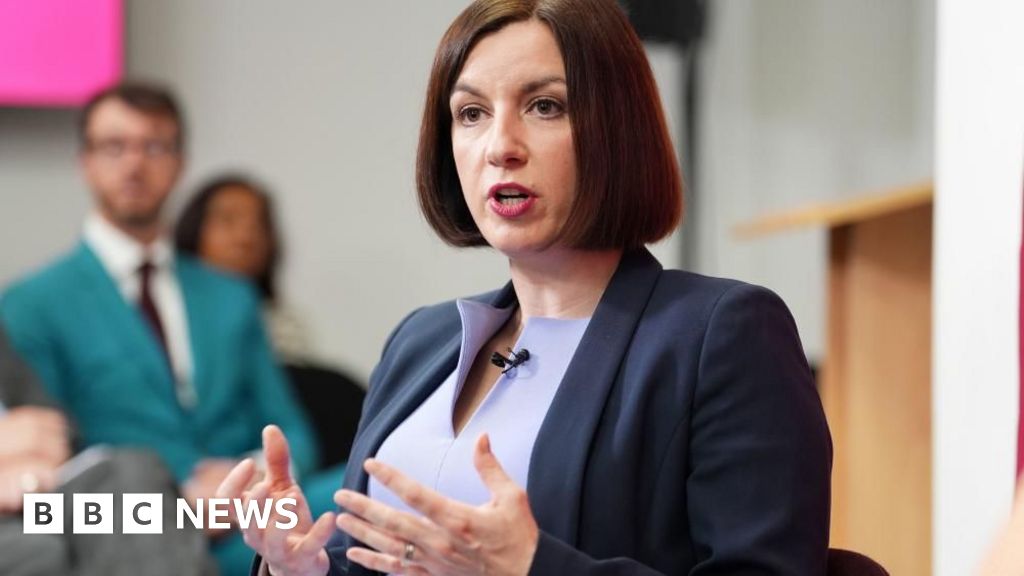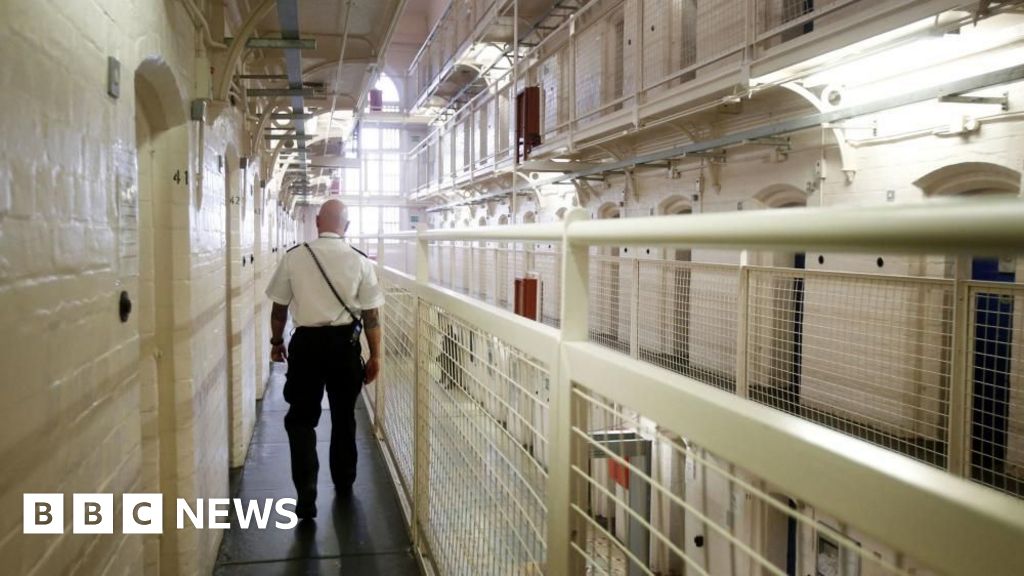ARTICLE AD BOX
 Image source, PA Media
Image source, PA Media
Rishi Sunak defended his Rwanda plans at a press conference on Thursday
By Laura Kuenssberg
BBC News
Rishi Sunak had significant doubts about sending migrants to Rwanda when he was chancellor, papers seen by the BBC suggest.
They suggest he wanted to scale back No 10's original plans.
They also indicate Mr Sunak was not sure they would stop Channel crossings.
They also suggest he was reluctant to fund reception centres to accommodate migrants instead of using hotels or private housing because "hotels are cheaper".
As prime minister, under pressure from his party, Mr Sunak has made the Rwanda plan one of his top priorities.
The scheme to send some asylum seekers to Rwanda for processing and potentially resettlement, in order to deter people from crossing the English Channel in small boats, was first announced by then-Prime Minister Boris Johnson in April 2022.
Mr Sunak - who became prime minister in October 2022 - was Chancellor of the Exchequer when the Rwanda policy was announced.
The deal has been repeatedly delayed by legal challenges and no asylum seekers have been sent from the UK so far.
The No 10 documents were prepared in March 2022, shortly before the deal with Rwanda to process migrants was signed.
They suggest Mr Sunak was concerned about the cost of sending asylum seekers to the African country, and wanted to limit the numbers initially.
They say, the "chancellor wants to pursue smaller volumes initially, 500 instead of 1,500" in the first year, and "3,000 instead of 5,000 in years two and three".
The documents describe a significant difference of view between No 10 and 11 Downing Street on the effectiveness of the proposed scheme saying the chancellor believes the "deterrent won't work".
Mr Sunak is also described as being reluctant to fund so-called "Greek-style reception centres", sites where migrants could be housed, rather than being put up in hotels which were said to be costing £3.5m a day at that point, the documents suggest.
They say, the "chancellor is refusing to fund any non-detained accommodation, eg Greek-style reception centres, because hotels are cheaper".
The documents suggest the Treasury preferred sending migrants to be housed around the country, known as "dispersal".
The papers also reveal that No 10 suggested Mr Sunak should be told to "consider his popularity with the base" if he was reluctant to sign up to changes to the migration system, including the Rwanda plan.
Despite the proposal being ruled unlawful by the UK Supreme Court, the prime minister has vowed to change the law so that flights can take off to Rwanda.
Yet the revelations about his doubts over the plan are likely to be awkward, especially as some MPs on the right of his party have urged him to go still further to meet his goal of stopping migrants crossing the Channel, potentially leaving the European Convention on Human Rights.
A source close to the prime minister told the BBC: "The prime minister was always fully behind the principle of the scheme as a deterrent.
"As chancellor it was his job to make sure it delivered and taxpayers' money was appropriately spent."
A government source said: "As chancellor, Rishi funded the Rwanda scheme and put it at the heart of his 10-point plan the month after becoming PM.
"Now he is passing the Rwanda Bill following the Supreme Court judgment to get flights off the ground. He is the first prime minster ever to oversee a reduction in small boat crossings, which were down by 36% last year."
In a statement, Labour MP and shadow home secretary Yvette Cooper said: "This shows what an utter con the Tories' Rwanda scheme is and how weak Rishi Sunak has now become.
"The prime minister knew the plan was incredibly costly and wouldn't work, and resisted it while he was chancellor. But he is so weak he has now agreed to write cheques to Rwanda for £400m without sending a single person there in a desperate attempt to shore up his leadership.
"Whether it be on Rwanda or hotel use, the Tories are continually going for gimmicks rather than ever getting a grip.
"It's time they gave up on this sorry charade and adopted Labour's plan to go after the criminal smuggling gangs, negotiating a new security deal with Europe to better protect our borders and set up a new returns unit to ensure those with no right to be in the UK are removed swiftly."
What is the Rwanda asylum plan?
On arrival, they could be granted refugee status and allowed to stay. If not, they could apply to settle there on other grounds, or seek asylum in another "safe third country".
The government said that "anyone entering the UK illegally" after 1 January 2022 could be sent there, with no limit on numbers.
But, so far, no asylum seeker has actually been sent.
The first flight was scheduled to go in June 2022, but was cancelled after legal challenges.
The government insists that the policy would deter people arriving in the UK through "illegal, dangerous or unnecessary methods", such as on small boats across the English Channel.
In January 2023, Mr Sunak said "stopping the boats" was one of his key priorities.
Last month, he vowed to "finish the job" of reviving the plan after the resignation of immigration minister Robert Jenrick, who stepped down over the government's revised policy, saying he believed it was destined for failure.

 1 year ago
35
1 year ago
35








 English (US) ·
English (US) ·